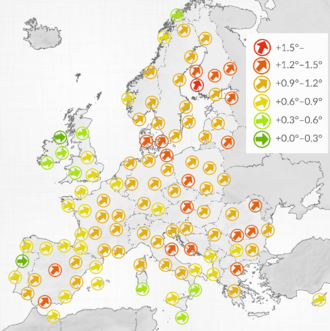
Climate change has resulted in an increase in temperature of 2.3 °C (4.14 °F) (2022) in Europe compared to pre-industrial levels. Europe is the fastest warming continent in the world.[2] Europe's climate is getting warmer due to anthropogenic activity. According to international climate experts, global temperature rise should not exceed 2 °C to prevent the most dangerous consequences of climate change; without reduction in greenhouse gas emissions, this could happen before 2050.[3][4] Climate change has implications for all regions of Europe, with the extent and nature of impacts varying across the continent.
Impacts on European countries include warmer weather and increasing frequency and intensity of extreme weather such as heat waves, bringing health risks and impacts on ecosystems. European countries are major contributors to global greenhouse gas emissions, although the European Union and governments of several countries have outlined plans to implement climate change mitigation and an energy transition in the 21st century, the European Green Deal being one of these. The European Union commissioner of climate action is Frans Timmermans since 1 December 2019.[5]
Public opinion in Europe shows concern about climate change; in the European Investment Bank's Climate Survey of 2020, 90% of Europeans believe their children will experience the effects of climate change in their daily lives.[6] Climate change activism and businesses shifting their practices has taken place in Europe.
- ^ Kayser-Bril, Nicolas (24 September 2018). "Europe is getting warmer, and it's not looking like it's going to cool down anytime soon". EDJNet. Retrieved 25 September 2018.
- ^ "Climate change impacts scar Europe, but increase in renewables signals hope for future". public.wmo.int. 2023-06-14. Retrieved 2023-07-09.
- ^ "Global and European temperatures — Climate-ADAPT". climate-adapt.eea.europa.eu. Retrieved 2021-09-12.
- ^ Carter, J.G. 2011, "Climate change adaptation in European cities", Current Opinion in Environmental Sustainability, vol. 3, no. 3, pp. 193-198
- ^ Abnett, Kate (2020-04-21). "EU climate chief sees green strings for car scrappage schemes". Reuters. Retrieved 2020-10-06.
- ^ "EU/China/US climate survey shows public optimism about reversing climate change". European Investment Bank. Retrieved 2021-07-15.